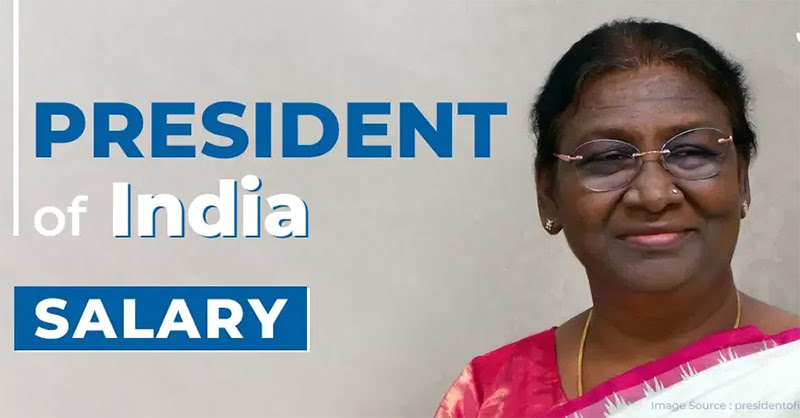The President is a stylized figure who carries out significant roles that incorporate selecting the State head and other high-positioning authorities, calling and proroguing Parliamentary meetings, and consenting to bills passed by Parliament. The President is entitled to a salary and allowances that are proportional to the prestige and importance of the position. The salary and allowances of the Indian President are established by Parliament and subject to periodic review and revision.
Salary Of President of India 2025
On September 11, 2008, Goverment of India has chosen to expand the salary of President of India to 1.5 lakh rupees (approx to 3.9 lakh in 2022). This salary was raised to 5 lakh in India’s Union budget in 2018 (or 5.9 lakh in 2025). The Indian president is also the head of a significant committee and has the authority to alter various committee decisions. Beneath we have talked about the President Of India salary each month in 2025.
Also Check:-
Prime Minister of India Salary
Per Month in Rupees
The Second Schedule of the Constitution states that the Indian president received a monthly salary of 1.5 lakhs. Additionally, the Indian president receives a variety of benefits and compensation. The salary was increased to 50,000 in 1998, which is equivalent to 190,000 in 2020. The Indian government decided on September 11, 2008, to raise the president’s salary to 1.5 lakh rupees (approximately 3.6 lakh in 2020). This compensation was increased to 5 lakh in the Union budget of India in 2018 (or 5.9 lakh in 2022). Aside from that, a sum of 225 million (comparable to 530 million out of 2020) yearly spending plan is designated for lookaftering to President Of India.
Role & Responsibilities of President of India
- The head of state and incomparable commandant of the Indian Military is the nation’s president.
- India’s laws and constitution must be upheld, guaranteed, and made sure as the president’s top priority.
- The President should be an Indian resident, no less than 35 years of age, and liberated from any place that would help the public authority in any capacity.
- The President resides in the Rashtrapati Bhavan of New Delhi.
- The administration may become vacant because of term limits, death, resignation, removal by the Supreme Court, impeachment, or term limits.
- The President is in charge of official, legitimate, conciliatory, and military matters, among other areas.
- In view of advice from the Head of the state and the Panel of Ministers, the President simply decides.
- The President must use his or her sacred powers to control the Lok Sabha, the lower house of Parliament.
- In addition to a variety of allowances and benefits, the President receives a monthly salary of Rs. 5 lakh.
Also Check:-
Centrelink Payment Schedule July
Legislative Power of the President of India
The Indian Constitution has given the Parliament of India, whose head is the president, legislative authority to speed up the process of making laws. Prorogue occurs when the president convenes both houses of parliament. The Lok Sabha can be dissolved by him. Article 87 says that the president gives speeches to parliament after the general elections and at the beginning of each year’s first session (1). The president’s address typically aims to outline the new government policies on these occasions.
Executive Powers of the President of India
In accordance with Article 70, parliament may grant the president additional executive powers, which the president may then delegate to state governors in accordance with Article 160. The Union cabinet, which is led by the Prime Minister, should assist and advise the president in his duties. Article 74(2) states that the president’s council of ministers or prime minister are not legally responsible for the advice they give him; instead, it is only the president’s responsibility to make sure his responsibilities are carried out in accordance with the constitution.
Judicial Powers of the President of India
The president appoints the Chief Justice of India and other judges based on the advice of the Chief Justice of India. The Attorney General of India, the Indian government’s top legal counsel, is designated by the president of India under Article 76(1) and serves at the president’s pleasure. Under Article 143, the president may seek the advisory opinion of the Supreme Court in the event that he believes a legal challenge or issue of public interest has arisen.
Also Check:-
Documents Required for Passport in India
Final Words
5 lakh rupees is the President of India’s monthly salary. The President is entitled to a variety of allowances and expenses, including travel, entertainment, and estate maintenance, in addition to his salary. In addition, the President has access to a free official residence, free medical care, domestic staff, automobiles, and air travel. It is essential to keep in mind that the Pay Commission, which is appointed by the government, may alter the President of India’s salary and other benefits.
